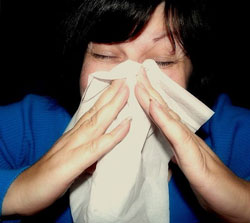
Top stories






More news


Marketing & Media
Ads are coming to AI. Does that really have to be such a bad thing?














Seasonal allergic rhinitis (hay fever) is caused by allergens from the pollens of grass and trees that are carried by the wind. It is virtually impossible to avoid contact with these allergens, so sufferers either have to suffer through the symptoms with many boxes of tissues or make use of medical treatments such as antihistamines and steroid sprays.
According to Dr Altman via the website www.mothernature.com, a woman's menstrual cycle can aggravate the condition. "Some women notice either worsening or improvement of their allergy symptoms at different phases of the menstrual cycle," he says. At menopause, some women who go on hormone replacement therapy (taking both oestrogen and progesterone) experience an increase in nasal congestion. And if they have allergies, they may be even stuffier.
Pregnancy can also affect allergy symptoms. "Approximately one-third of women find their allergies get worse, one-third experience no change, and one-third experience improvement in their symptoms," adds Dr. Altman. "In women who experience an improvement, the cause is not clear," says Dr Gruchalla, "and sometimes the improvement will continue even after the woman has had her baby."
Tips